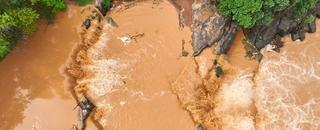
Building Near Rail Lines in Canada: How to Manage Noise, Vibration, and Approvals
by Ben Adler
View post

This is the sixth article in our The Journey to Nature Positive series, where our specialists illustrate how Nature-based Solutions (NbS) can tackle societal challenges, offer additional benefits over engineered solutions, and promote a nature-positive world.
For a refresher on what we mean by Nature-based Solutions and the topics discussed in the series thus far, view:
Today, we are exploring how NbS can provide options for managing water, reducing risk, and enhancing climate resilience.
Climate change is driving more frequent and severe droughts and floods, presenting complex challenges for communities, infrastructure, and ecosystems worldwide. Traditional engineering solutions, while effective in some contexts, often fail to address the root causes of these risks and can inadvertently degrade natural systems. NbS offers a more sustainable, adaptive approach, harnessing the power of ecosystems to enhance resilience and deliver multiple benefits.
As global temperatures rise, precipitation patterns become more variable. Some regions experience prolonged dry spells, leading to water shortages and stressed ecosystems, while others face intense rainfall events that overwhelm drainage systems and cause devastating floods. Both extremes threaten critical infrastructure, agricultural productivity, water quality, and biodiversity — and disproportionately impact vulnerable communities.
NbS leverage natural processes and ecosystems to manage water, reduce risk, and enhance resilience. Key examples of this include:
These solutions are flexible and scalable, suitable for urban, rural, agricultural, inland, and coastal environments. They can also be integrated with traditional infrastructure to create hybrid systems that maximise resilience.
Beyond risk reduction, NbS improve water quality, support biodiversity, provide recreational and cultural value, capture atmospheric carbon, and strengthen community well-being.
Our Climate Resilience team brings together multidisciplinary expertise in climate science, engineering, ecology, operations and management, and stakeholder engagement to help clients navigate increasing climate risks and opportunities. We work closely with clients to identify vulnerabilities, model future climate scenarios, and develop tailored strategies that integrate Nature-based Solutions with traditional infrastructure to build long-term adaptive capacity and ensure that communities and assets are better prepared for a changing climate.
Below are some examples of our project experience that demonstrate the practical application of Nature-based Solutions for climate resilience:
Connecticut, USA
NbS: Coastal habitat restoration, shoreline stabilisation public engagement.
Outcome: Enhanced coastal resilience, improved wetland stability, and increased environmental stewardship.
Eastern New York State, USA
NbS: Floodplain restoration, stakeholder engagement, hydraulic modeling.
Outcome: Provided actionable flood mitigation plans for communities, integrating NbS with engineered solutions.
Massachusetts, USA
NbS: Dam removal, river restoration, modern bridge design.
Outcome: Improved flood resiliency, restored fish passage, and reduced community risk.
Vermont, USA
NbS: Floodplain restoration, riparian forest planting, infrastructure relocation.
Outcome: Reduced flood risk, stored floodwaters, and improved ecosystem health.
Connecticut, USA
NbS: Living shorelines, hybrid grey/green infrastructure, climate vulnerability assessment.
Outcome: Advanced resilience planning, informed policy, and guided investment.
New York, USA
NbS: Bioengineering, channel restoration, in-stream structures.
Outcome: Improved water quality, stabilised stream banks, and enhanced ecological function.
Vermont, USA
NbS: Floodplain restoration, stakeholder engagement, hydraulic modeling, park design.
Outcome: Improved local flood storage, integrated NbS with community use needs.
NbS provide significant opportunities to accelerate sustainable approaches to building climate resilience. Delivering on this ambition will require specialists (including Aquatic Ecologists, Hydrologists, Hydrogeologists, Engineers, Soil Scientists, Economists, Social Scientists, and Climate Scientists) collaborating to plan, design and implement schemes that work and integrate with primary project outcomes.
Our industry leading specialists offer comprehensive aquatic environmental, ecology, and biodiversity services globally. They can support your organisation with governance and strategy advice, as well as operational project support to incorporate NbS at all stages of infrastructure developments.
To speak with one of our specialists, contact us today.